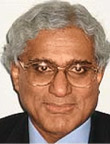Integrated SL economy more vulnerable to external risks
By Gamini Warushamanna
The Sri Lankan economy is now more integrated into the global capital
market compared to our position at the time of the global financial
crisis in 2008 and, therefore, we are more vulnerable to external risks,
economist Dr. Indrajit Coomaraswamy told a seminar on ‘Tapering of
Quantitative Easing (QE) and its global impact’ organised by the Sri
Lanka-Italy Business Council in Colombo last week.
 Dr. Coomaraswamy said that after 2008 there were five government bond
issues and with this integration to the global capital market Sri Lanka
is more vulnerable to risks similar to the 2008 financial crisis. Dr. Coomaraswamy said that after 2008 there were five government bond
issues and with this integration to the global capital market Sri Lanka
is more vulnerable to risks similar to the 2008 financial crisis.
During the 2008 financial crisis there was an adverse impact on trade
but the financial impact was less because “we were less integrated.”
Dr. Coomaraswamy said that during a financial crisis treasuries in
many countries pump money to fiscal stimulation programs while Central
Banks attempt to maintain lower interest rates.
Governments also infuse a lot of capital into the banking system and
as a result losses shifted from banks' balance sheets to government's
balance sheet.
In this QE program, the US government spends $85 billion a month for
asset purchase and from December 2013 the US monetary authorities
started to reduce purchases by $10 billion each month, known as tapering
of QE, as the US economy continued to improve.
It is a data driven program based on indicators such as inflation,
stocks and unemployment.
The US economy is picking up and fundamentals are good and the US Fed
targets two percent inflation, 6.5 percent unemployment rate and
continues accommodative monetary policy.
The housing market where the financial crisis started too is picking
up. The US Fed has taken this data as a signal to taper QE and has now
reduced it to $ 65 billion per month and the program will end this year.
He said that countries with large current account deficits are
vulnerable to the impact of tapering of QE and countries such as India,
Turkey and South Africa are under pressure.
This will create outflow of money. If there is default by a bank or
large corporate as a result of huge outflow of money it will create a
risk similar to the Asian financial crisis in 1997.
Sri Lanka's external reserve is at $8.2 billion and the recent $ 1
billion bond issue has been put into reserves.
The fiscal deficit is coming also down and if the country can
maintain this fiscal discipline we can reduce vulnerability.
As a middle income country Sri Lanka is now under the watch of rating
agencies, the IMF and the World Bank and the authorities are compelled
to maintain fiscal discipline, Dr. Coomaraswamy said.
On the day of Ben Bernanke's last press conference as chairman of the
Federal Reserve, the Federal Open Market Committee finally decided to
scale down its $85 billion-a-month asset purchase program.
Instead, US monetary authorities would reduce purchases by $10
billion each month so long as the US economy continued to improve.
Despite initial falls in the currencies of some emerging market
nations, by the beginning of this year some observers, such as
Templeton's Mark Mobius, said they believed the fear that tapering would
affect emerging market investment was overblown.
|

